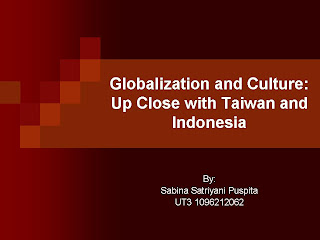
Wenzao, Kaohsiung, 29 December 2009
I was given a wonderful opportunity to be speaker for my graduating senior's mock conference. I was to be speaker, and them, my interpreters. The topic should be related to globalization and should be delivered within 10 minutes; and so this is my speech:
Globalization and Culture: Up Close with Taiwan and Indonesia
Introduction
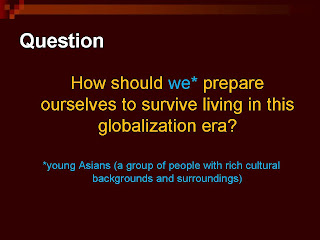
Good afternoon, professor, ladies and gentlemen. I hope that despite of the cool weather today, everyone here is still in much spirit and energy to listen to my unlikely interesting presentation. In the next 10 minutes, I would like to try to share with you what I have been researching since my senior year in high school about globalization and culture.
By the end of the presentation, I hope that you would already have known how important cultures are for globalization; and thus, how we as young Asians, a group of people with rich cultural backgrounds and surroundings, should prepare ourselves to survive living in this globalization era.
1. Globalization and Culture
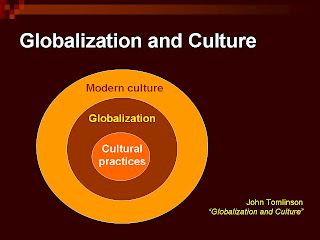
To get started, here is how specific we shall define the term ‘culture’ throughout this presentation:
humans’ everyday cultural practices cause globalization, and globalization creates our modern culture.
I hope that we now already have the basic idea that globalization and culture mutually affects each other, thus avoiding or getting rid of one of them may bring us huge problems.
2. Taiwan: the Little Tiger of the East
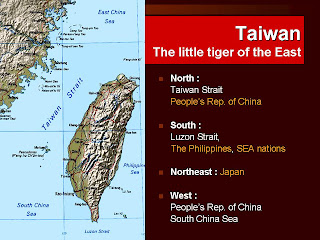
Why do many people describe Taiwan as the little Tiger? Well, it is certainly because Taiwan is a tight little isle located on the southeast side of the giant land China or the People’s Republic of China. Despite its being little, Taiwan’s modernity and rapid economic development made it one of the successful leading models in Asia, and is a central hub that connects Japan and China with Southeast Asian nations, which are also important nations in business and trade.
Then again, this strategic location made the cultures in Taiwan diverse, a hybrid blend! Taiwan has not only been westernized, mostly influenced by the US, but also maintains its mainly Chinese roots and a small part of its Japanese heritage. Also, not to forget, the aboriginal cultures Taiwan has. Together with the Chinese settlers Taiwan has enough talents:
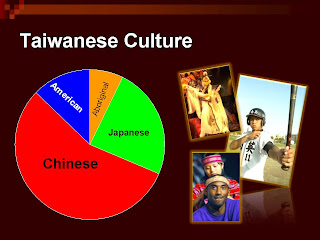
“…in establishing and managing manufacturing operations in different geographic locations with diverse cultural backgrounds to meet the demands of globalization activities…and knows how to train workers in different cultural environments.”
From my own observation, what makes Taiwan successful in earning world recognition of its hi-tech features and stability, despite its sovereignty remains unsettled, is how the government and it people’s attitude toward preserving the historical aboriginal cultures, existing Chinese cultures, and global modernity is very positive. An enforced set of laws and effective cultural bureaus even strengthen Taiwan.
3. Indonesia: the Heavyweight of Southeast Asia
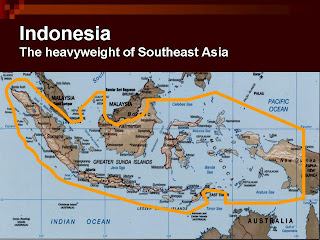
Different from Taiwan, basically intense cultural problems are the ones that kept Indonesia struggling to leap forward economically, politically, and socially in globalization activities.
Indonesia is described as ‘heavyweight’ because of its vast territory, huge population, and legacy of anti-colonial struggle—Indonesia is the first nation in the Southeast Asian region to proclaim independence by itself after the surrender of Japan. Hence, this sense of nationalism in our culture is very strong. For example: flag-rising ceremonies every Monday morning is compulsory in elementary to junior high schools.

Despite this nationalistic culture, in reality, living in a huge archipelago with more than 300 ethic groups and local dialects, ethnic tensions between “indigenous” and Chinese communities still happen often. Despite its being an Indian and Malay archipelago, many believed that Taiwan’s aborigines were the actual ancestors to most of Indonesia’s indigenous communities.
Religion in Indonesia is on top of everything else. Therefore, if most of the lawmakers are followers of a particular religion only, their decisions can be viewed as a disadvantage for
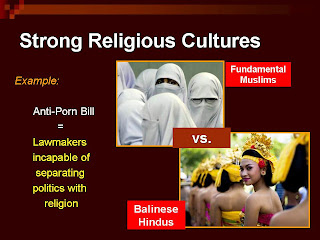
other followers or cultures. Example: last year, the government carried out an anti-pornography and anti-porno actions bill, giving criteria for women on how they should dress appropriately in public otherwise fined or jailed. The Hindu people in Bali made huge protests, because its rich Hindu art culture, which has been bringing billions of money for Indonesia through foreign tourists, fit to the criteria to be sent to jail.
4. Conclusion
Finally, ladies and gentleman, I hope the points I have said just now are evident enough to show you how culture matters for globalization. From the two countries’ background and development, we can conclude that the era for globalization needs the world society to:
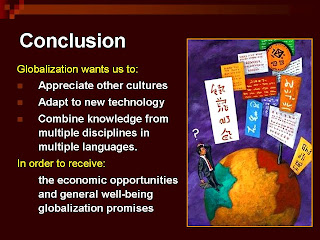
1. Appreciate other cultures
2. Adapt to new technology
3. Combine knowledge from multiple disciplines in multiple languages.
Otherwise, globalization would only leave us being unable to receive the economic opportunities and general well-being globalization promises. Thank you.
----------------------------------------------------------------------------------------------------
I don't know if it made any sense, but I was surprised and very grateful that the audiences' (all of them are seniors) response showed a great deal of enthusiasm. I think they understood the points that I was trying to reach out. Plus, I received a stipend from my seniors after the speech. LOL. Many thanks to the people who made this happen. I enjoyed the process and appreciate the outcome of it.
God bless,
S.
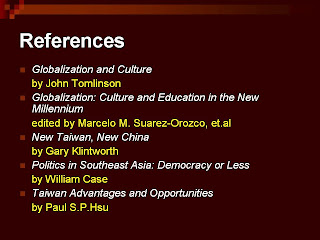




評論(0)